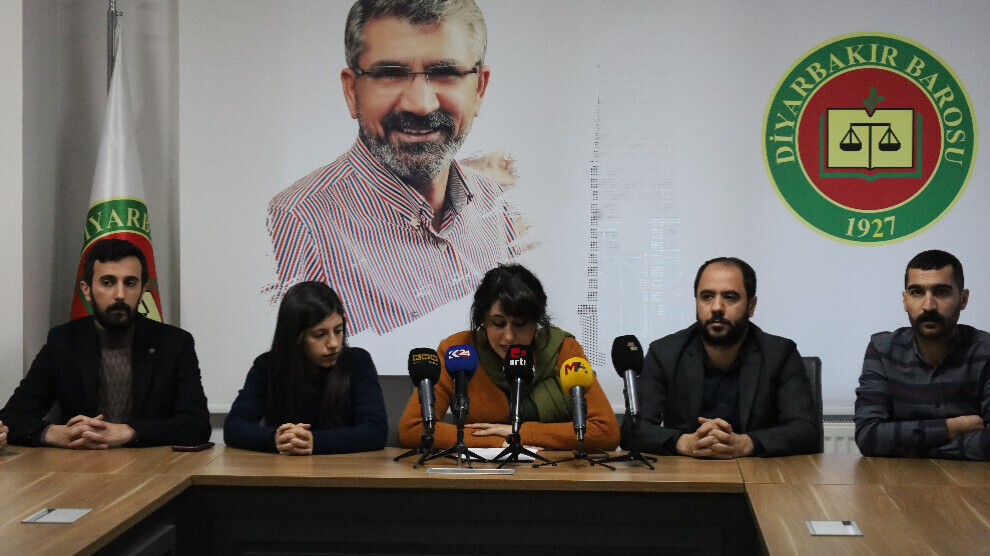Hunger Strikes Monitoring Coordination calls for immediate action
The Hunger Strikes Monitoring and Follow-up Coordination, which announced its report on the hunger strikes initiated by prisoners, said: "Action must be taken before deaths occur".
The Hunger Strikes Monitoring and Follow-up Coordination, which announced its report on the hunger strikes initiated by prisoners, said: "Action must be taken before deaths occur".

The Hunger Strikes Monitoring and Follow-up Coordination formed by Diyarbakır Bar Association, Human Rights Association (IHD) Branch, Association of Lawyers for Freedom (ÖHD) Branch, Association for Support and Solidarity with Families of Prisoners and Detainees (TUAY-DER) announced the report prepared on the hunger strikes in prisons at Diyarbakır Bar Association Legal Aid office.
Diyarbakır Bar Association Prison Monitoring Commission Secretary, Lawyer Reyhan Gök read the text of the statement and said: “The hunger strike action, which was announced to the public on 27 November 2023 by prisoners demanding an end to the human rights violations in prisons in Turkey, improvement of the aggravated conditions of execution, an end to the long-standing isolation of Abdullah Öcalan in İmralı High Security Closed Penal Institution, granting of family and lawyer visits to Öcalan and a democratic solution to the Kurdish issue, has spread to many prisons in Turkey as of today and continues on its 22nd day."
Pointing out that the political power and authorised institutions have not taken any steps to end the hunger strikes, Reyhan Gök said: "All rights of prisoners, especially their dignity, right to life and right to health, are the responsibility of the state. The possible ban on sugar, salt and vitamins by prison institutions at any stage of hunger strikes is an attitude that can be considered as torture and ill-treatment spread over time in the context of the right to life. Prisoners on hunger strike should be provided with 5 large glasses of water/liquid, 2 teaspoons (2 g) of salt, 5 tablespoons of sugar, 1 teaspoon of baking soda and 500 mg of vitamin B1 containing complex vitamin B preparations."
Reyhan Gök pointed out that if these substances, which should be taken at a minimum level, are restricted, it will cause permanent damage to the brain functions of prisoners and even death, as in hunger strikes in the past years, and continued as follows: "In order to prevent the emergence of additional health problems; prisoners on hunger strike should be regularly monitored by health professionals in accordance with their consent, they should be provided with the water, salt, sugar and vitamin B they need, they should be provided with companionship when they are unable to take care of themselves, they should not be kept under isolation and use of force should be avoided. As a matter of fact, in the Malta Declaration of 1991, the World Medical Association defined a hunger striker as 'a mentally competent person who has voluntarily decided to go on hunger strike and therefore refuses to take food and/or fluids for a certain period of time'."
Reyhan Gök stated that the isolation in İmralı F Type High Security Prison with absolute non-communication is against the Constitution, the European Convention on Human Rights (ECHR) and the Law on the Execution of Criminal and Security Measures. Remarking that the political power should consider the demand of hunger strikers before the process evolves to a more dangerous point, Gök said: "Otherwise, the political power will be responsible for the sad consequences that will arise regarding the prisoners' right to health and life. For this reason, the Ministry of Justice and relevant institutions should take action as soon as possible."
Reyhan Gök stated that the political power should take the necessary measures and take action to evaluate the demands of the prisoners' hunger strike in a peaceful way before deaths occur: "We call on the Ministry of Justice, national and international law and human rights institutions to be sensitive in order to approach the problem on the basis of fundamental rights and freedoms and to evaluate and resolve the demands in this direction,” she concluded.